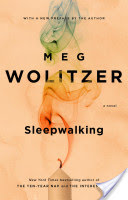 After Belzhar, I didn’t think I would pick up another Meg Wolitzer novel again, but the premise of Sleepwalking interested me enough that I thought I would chance it. Her debut novel, Sleepwalking encompasses nuggets of wisdom and insight and questions the genuine and artifice of being a person. How many of us can say we are true versions of ourselves without pause and without feeling a tugging sensation in our bellies?
After Belzhar, I didn’t think I would pick up another Meg Wolitzer novel again, but the premise of Sleepwalking interested me enough that I thought I would chance it. Her debut novel, Sleepwalking encompasses nuggets of wisdom and insight and questions the genuine and artifice of being a person. How many of us can say we are true versions of ourselves without pause and without feeling a tugging sensation in our bellies?
Wolitzer pointedly addresses these existential questions. It’s easier to tell a story that distinguishes the truths from the lies and leaves nothing for our imagination. In several instances, Sleepwalking is about finding out what is real amid the lies. It suggests to a certain extent how conformity is necessary to form connections with people; when we find common ground, we form friendships but in the process, we may assume appearances and characteristics different from our own. Sleepwalking makes a difficult case: how much of ourselves is affected by outside influences? Then what do you do when you realize this, when you’ve snapped out of your sleepwalking state? Do you go back to sleep, pretend like nothing’s changed, and hope for the better, or do you do something, and, if so, what?
Claire emulates the fictional, deceased poet Lucy Asher, Wolitzer’s hybrid creation spawned from Sylvia Plath and Anne Sexton. Claire not only dresses and looks like the late Lucy Asher, but she seems to adopt the poet’s mentality. Claire characterizes the observant narrator who’s too stuck in her head. When she begins a relationship with Julian, it’s not about just being a “death girl” anymore. She has interests outside of her devotion and study of Lucy Asher, which is a problem. Claire resorts to a drastic solution that takes her to the Asher’s home, where Lucy Asher’s parents still reside and mourn their daughter.
When reading about Claire Danzinger, I knew her. I knew her waspy, estranged family, her short list of intellectual, close-knit circle of night owl friends that stayed up till dawn reciting from lyrical lines from their favorite poets, and the boyfriend, awkward and fumbling, a good guy who treats his girlfriend like an epitaph and tries to understand her morbid fascination with suicidal, dead poets. She and her friends are known on campus as the “death girls,” but really, anyone who has been enthralled with a poet’s work and life finds themselves identifying with not only his or her work but the author’s life. The author’s work resonates with you, describes what you couldn’t. This novel offers the collective examination of the characters’ lives and the influence of people’s presences. Devoted, hard-core, literary lovers will love this novel.
It’s interesting reading how Lucy’s mom interacts with Claire, who turns into an eggshell despite sleeping in Lucy’s room and wearing her beloved poet’s clothing. Claire’s responses are muted by the presence of the parents, her treatment of Lucy’s belonging taciturn yet cognate. So rarely do we meet the people we admire, and when we do: let’s face it, we lose our composure and turn into those annoying fans we promised we’d never be. Claire’s reaction separates her from being just an obsessed admirer, although none of Claire’s behavior could be considered normal. But then again, books with well-adjusted teens/adults bore me, and, not to mention, are too perfect.
It’s as if Claire were Lucy with amnesia. Their persons overlap the other. I can’t tell if this is who Claire is, if she has always been similar to Lucy, or if Claire adopted Lucy’s persona when happening across her work; however, the novel, gives the impression of the former. I wonder though.
As Claire peruses Lucy’s belonging, we know just as much as Claire knows that there’s no finding or learning some awesome truth to explain everything about who Lucy was. Scavenge her biographies, journals, letters, but there is never Lucy Asher. The poet’s death encapsulates her and creates a kind of mythos, found posthumously in the legacy of Sexton and Plath. The mythos surrounding Lucy Asher exaggerates and obscures her person. Her work and life enshrines Asher and keeps her readers and admirers at a distance. The effect of this stretches even to Asher’s parents, who endure a different type of mourning as they must contend with their daughter’s legacy, the media, and a legion of Asher worshipers.
Wolitzer’s novel is smart and exemplifies rhetoric and maturing prose. Several times I stopped to absorb the content and sound of her lines. When learning that Wolitzer wrote the piece during her undergraduate career, it brings to mind the image of a young woman with an insatiable and venereal fascination with literature and its predecessors, which nearly made Sleepwalking a meta-fiction reading experience.
With all of that said, Sleepwalking is sadly not for everyone. It falls into a particular but equivocal true literary genre. It analyzes human isolation, relationships, loss, and as mentioned earlier, identity. Wolitzer even notes in her introduction that she wrote the novel with no targeted audience in mind. It will especially appeal to avid readers of the classics, or people who harbor esoteric obsessions with literary writers.
Rating: 4.4 out of 5
